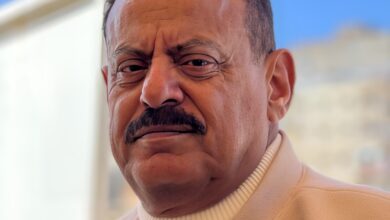Failure in Poetry

Yemeni mp
Ahmed Saif Hashed
My failure in writing short stories meant that I couldn’t remain stagnant; I had to leave that place, change my path, or seek another harbor more suitable for me. The English proverb states, “You cannot discover new oceans unless you have the courage to lose sight of the shore.” I must change my direction, for failure, as the self-development speaker Zig Ziglar says, “is a forced redirection, not a dead-end.” Or in the words of Saudi writer and media figure Ahmed Mazen Al-Shuqairi: “It doesn’t mean you are a failure; it means you haven’t succeeded yet.” Perhaps they are all right in their insights.
I tried to knock on the door of poetry, hoping to find it open and welcoming. Yet, the intricacies of meter are difficult and exhausting. This was revealed to me during my high school experience. Between me and poetry lie sixteen seas, without a single raft to navigate them!
Why are they called seas, when they also bear names like the long and extended? In truth, they are constraints and limitations that constrict me, and I feel suffocated by them, struggling to breathe. How can I navigate them without a boat or oars? How can I begin my journey with poetry that enchants me, that I enjoy listening to, yet struggle to create or write?
How can my journey in poetry proceed when I have no provisions, no water, and no mount? I studied meter in high school and found it daunting, and I do not believe a day will come when it will become easier for me. From where could it soften? I doubt it will, especially as I sense an expansive barrenness in my memory.
Traditional, metered poetry, with its many artistic constraints, requires a strong reservoir and a wealth of language, neither of which I possess. Moreover, I long for vast spaces of freedom, while the numerous rules and standards drive me to madness. Yet, there exists free verse, liberated from the many constraints imposed by traditional poetry. Nevertheless, I do not savor this form; I do not appreciate it, nor do I lean toward it. So I spoke to myself, convincing it to attempt to evoke musical rhythm while bypassing rhyme without triviality or excess. A try would not hurt.
I embarked on my intention, and my first attempt, relatively long, was titled “Bilqis,” referring to Yemen. I sent it to the 14 October newspaper, which published an excerpt on 24/5/1985, beginning with:
Bilqis, a face divided
by the trenches of borders,
and furrowed
by stumbles and journeys,
and the invader feasted
on its bounty,
plates
and sipped from its freshness,
goblets and destinies.
***
We are pained by our love for her,
and love is a hell.
Let our hearts
be a home for hell.
I wrote another poetic attempt dedicated to the 12th World Youth Festival held in Moscow, published in full by 14 October on 26/7/1985, titled “To the Youth.” Previously, it had been published by Al-Rayah newspaper on 9/6/1985 under the title “The Promises of Our Green Dreams.” It began with:
Hurrah, your festival! A celebration that crowns
suns in the sky of tomorrow,
rising and smiling,
youth from all around the earth,
united in their streams
for horizons
that nations aspire to.
Youth, with determination, their arms are woven,
and in the bastions of knowledge, they are safeguarded and fortified.
On July 2, 1985, I wrote a poem for Randa, whom I had loved for many years, though she did not love me back simply because she was unaware of my feelings. I began my attempt with these lines:
You have ignited, O Randa,
my life in the depths of your eyes,
and I roamed the horizons,
yearning for the future.
I sent it to both the 14 October newspaper and Al-Rayah for publication, but neither printed it. To console myself, I envisioned the death of “Randa” I loved and penned a vertical poetic attempt on April 30, 1985, which began:
In your love, I spent my life in loyalty,
so how can hope be severed today?
For patience has not become bliss,
nor has separation turned into reunion.
Indeed, patience has become a hell,
and separation has turned into misery.
This poem, too, found no avenue for publication.
I wrote another piece titled “Sana’a, My Bereaved Mother,” starting with these lines:
Sana’a suffers and endures
the triad of the dark tunnel,
feeding on the lashes of the whip
and swallowing cups of bitterness.
This poem also failed to find its way to print.
Many poetic attempts were made, most of which went unpublished. The few that did make it to print were relegated to the readers’ page, with some only seeing small excerpts published. Much of the waiting for publication felt like a futile endeavor, a mere mirage. I sensed that poetry was more elusive for me than my attempts at writing stories. I recognized that I was not gifted in it nor deserving of the title, lacking even the barest hint of talent. I accepted that I could never be a poet, despite my aspirations. Yet, as the saying goes, “Not everything one desires is attainable,” and so I ceased my attempts.
Although I recited some of those poems on various occasions and felt they were somewhat well-received by listeners, I was aware that these efforts were outputs of hard work, not the fruits of talent.
Despair overtook me, and I felt a profound disappointment in my poetic endeavors, yet it was the bitter truth: I was not talented and would never be. Poetry, above all else, requires talent, which I lacked and would continue to lack. I became increasingly convinced that I had no steed or field in the realm of poetry.
* * *






